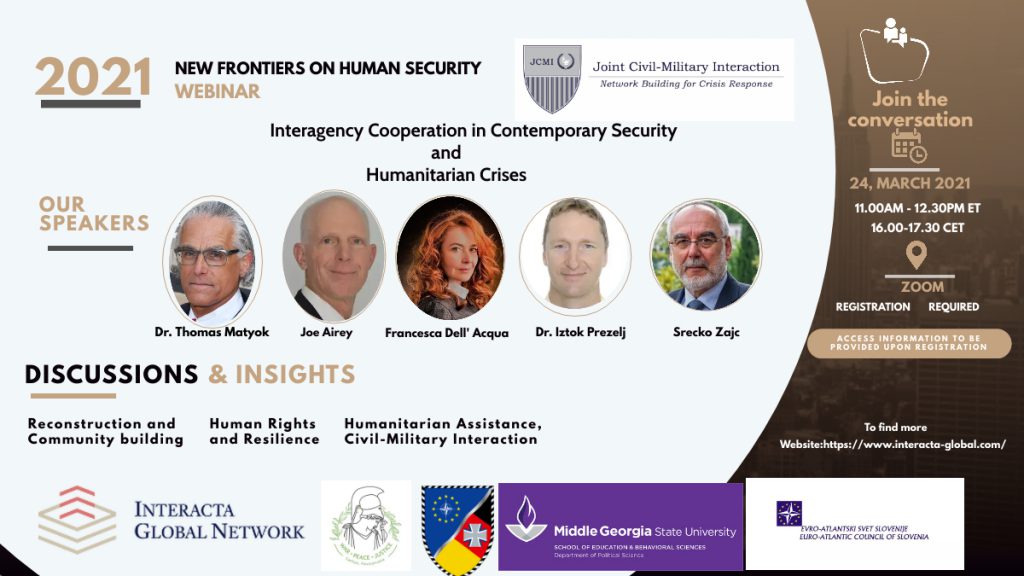The Euro-Atlantic Council of Slovenia co-hosted a webinar on interagency cooperation in contemporary security and humanitarian crises together with Joint Civil-Military Interaction Initiative, Interacta Global Network, Middle Georgia State University and others. The debate was moderated by Thomas Matyok, PhD, Director of the Air Force Negotiation Center and Associate Professor of Conflict Analysis and Resolution at Air University.

Speakers at the seminar:
- Iztok Prezelj, Euro-Atlantic Council of Slovenia, President & Faculty of Social Sciences, University of Ljubljana, Vice-Dean
- Joe Airey, retired head of the FBI’s Joint Terrorism Task Force in Denver
- Francesca Dell’ Acqua, Trainer in negotiation, intercultural communication, security and gender issues with experience gained in conflict and post-conflict areas in Asia, Africa, the Middle East and Eastern Europe.
- Srečko Zajc, former journalist, chief editor, manager, secretary general of the national Red Cross society, member of Interacta Global Network
Dr Prezelj: Interagency cooperation refers to common activities of two or more agencies to achieve common supra-agency goals. The need for this approach in tackling complex security and humanitarian problems is great, but we also face many challenges in this field. Interagency cooperation is required in all phases of crisis management (pre-crisis phase, crisis phase and post-crisis phase). Typical interagency problems are: lack of trust, insufficient sharing information, competition, secrecy versus openness in networks, duplication of activities, difficulty of monitoring scattered network activities, misinterpretation of what interagency cooperation means, unclear network boundary – where does crisis management/counter-terrorism network end, no clear benchmark for success, insufficient network learning, weak motivation and sanction tools, etc.
Airey: There is a substantial interagency cooperation between law enforcement and the military, where both have different roles and legal basis. The military provides the forces needed to deter war and ensure security, the law enforcement on the other hand protects the people and upholds domestic laws. During major public events, the military provides assistance to the law enforcement with additional resources available only to the military. Examples of requested resources are communication capabilities, transportation or air support, emergency operation center, etc. Best interagency cooperation can be achieved when planned (various documents, exercises, rules…). Interagency cooperation is also an opportunity to learn from each other. Airey stressed also that every agency needs to stay inside its jurisdiction.
Dell’ Acqua: The humanitarian system is an organic construct, like a constellation: a complex whole formed of interacting core and related actors. The center of gravity in the humanitarian crisis is the affected community. The ones who provide support are: diaspora groups, military forces, national NGOs, private sector, etc. The humanitarian systems exists to fill the gaps (e. g. can supplement national capacity to respond to a disaster). In peacetime, it is easier to cooperate than in a combat situation. It is important to share information, avoid competition, divide tasks, minimize inconsistency and pursue common goals.
Zajc: Interagency cooperation works better on national rather on international level. Agencies are responsible to money and not to the people. Comprehensive approach is not a reliable solution and cooperation is not competition. Leave military language behind and start to learn and use scientific language. In order to understand each other, we should change our thinking (start learning from lessons).
Speakers also answered questions from the public related to methodologies for building the trust, dealing with political agendas and accountability.
